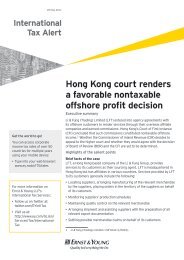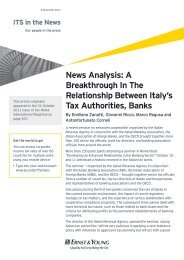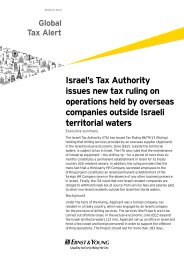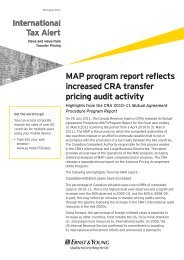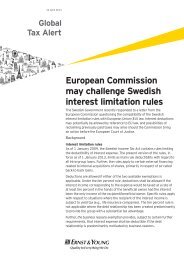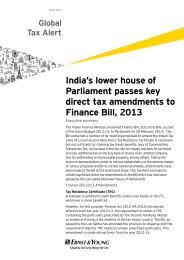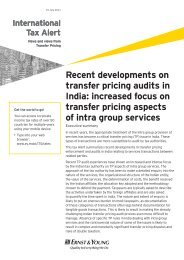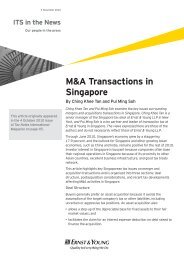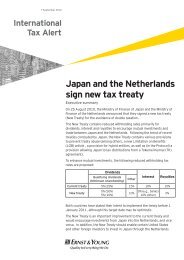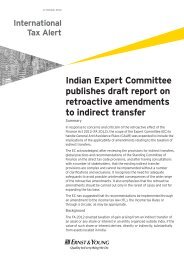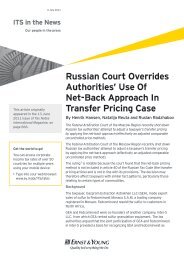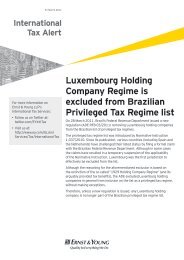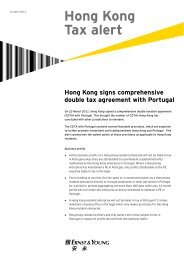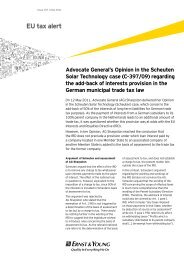(GST) compliance obligations (pdf, 5.62 MB) - Ernst & Young T ...
(GST) compliance obligations (pdf, 5.62 MB) - Ernst & Young T ...
(GST) compliance obligations (pdf, 5.62 MB) - Ernst & Young T ...
Create successful ePaper yourself
Turn your PDF publications into a flip-book with our unique Google optimized e-Paper software.
“In South Africa, the last 5 to 10 years saw SARS on a taxpayer<br />
service campaign where the focus was to encourage multi-national<br />
VAT taxpayers to become more compliant with the administrative<br />
side of VAT, namely, filling VAT returns correctly on time and making<br />
payments and so on. But we’ve expanded the focus on <strong>compliance</strong><br />
activities since the start of the recession. Recently the Minister of<br />
Finance and the Commissioner have by public notice communicated<br />
that SARS will focus on revenue and refund <strong>compliance</strong>.”<br />
Prenesh Ramphal, Senior Manager of VAT Research and Development,<br />
South African Revenue Service (SARS)<br />
The “right” amount of tax?<br />
Paying the “right” amount of VAT means<br />
not paying too little VAT — or too much.<br />
The VAT system provides that registered<br />
businesses may deduct or recover<br />
VAT paid on most legitimate business<br />
expenses. However, not all VAT is<br />
recoverable — different countries either<br />
allow or block different expenditure,<br />
especially related to travel and expense<br />
costs. For example, if an MNE hosts a<br />
conference for its sales force in country<br />
A, all the hotel and catering charges<br />
may be treated as recoverable, whereas<br />
the same costs may be blocked if the<br />
conference is held in country B.<br />
Foreign VAT recovery<br />
Even for accepted business expenses,<br />
recovering foreign VAT may be an issue<br />
and most MNEs incur VAT in countries<br />
where they are not established. Although<br />
there are mechanisms for mutual VAT<br />
recovery, most notably in the EU, many<br />
countries around the world do not refund<br />
VAT to non-resident businesses. Even<br />
where a refund scheme exists, it may not<br />
be open to businesses from particular<br />
countries (such as to businesses<br />
established in the non-EU countries that<br />
do not refund VAT) or it may be difficult<br />
for foreign companies to fulfill the<br />
requirements in practice.<br />
The Organisation for Economic<br />
Cooperation and Development (OECD)<br />
recently reported on this issue. 5 In 2006,<br />
the OECD’s Committee on Fiscal Affairs<br />
(CFA) adopted the principle that “the<br />
burden of value-added taxes themselves<br />
should not lie on taxable businesses<br />
except where explicitly provided for<br />
in legislation.” It undertook surveys<br />
of both governments and businesses<br />
to estimate the extent to which this<br />
principle was applied to VAT incurred<br />
abroad. The OECD’s report, published in<br />
February 2010, indicated that, although<br />
5<br />
VAT/<strong>GST</strong> relief for foreign businesses: the state of play<br />
OECD 2010<br />
most OECD member countries have<br />
implemented VAT relief procedures, they<br />
are frequently complex. More than 80%<br />
of businesses surveyed by the OECD<br />
indicated that they cannot recover all<br />
their foreign VAT and more than 20%<br />
reported that they are unable to recover<br />
any foreign VAT, at all. A large number<br />
(72%) of the businesses surveyed said<br />
that they found these procedures<br />
“difficult,” and a third said that these<br />
difficulties influenced decisions on<br />
investment.<br />
The OECD comments about the<br />
survey: “... businesses would like to<br />
see improved communication with tax<br />
administrations. Greater harmonization<br />
and standardization of the procedures<br />
would speed up and improve these<br />
repayment systems. The CFA will continue<br />
to work on these issues with a view to<br />
helping countries improve their VAT<br />
relief procedures while at the same time<br />
providing safeguards against fraud.”<br />
Paying VAT twice<br />
Economic double taxation is a genuine<br />
risk in some business sectors. Complex<br />
transactions may be hard to classify<br />
for VAT purposes; this increases the<br />
likelihood that countries’ VAT systems<br />
may treat the same activity in different<br />
ways or that tax administrations may<br />
arrive at different conclusions based<br />
on the same facts. For certain types of<br />
trading activity — for example, crossborder<br />
supplies of energy — different rules<br />
mean that VAT may apply in more than<br />
one territory for the same transaction.<br />
Therefore, as matters currently stand,<br />
paying the right amount of VAT in these<br />
cases means paying tax twice. There<br />
is currently no formal mechanism for<br />
individual countries to resolve these<br />
instances of double taxation, as VAT is<br />
not covered generally by international<br />
double taxation agreements.<br />
VAT and <strong>GST</strong>: multiple burdens for multinational companies<br />
“As VATs have been<br />
spreading across the<br />
world, international<br />
trade has also been<br />
expanding rapidly. As<br />
a result, the potential<br />
for double taxation<br />
and unintentional nontaxation<br />
has increased.”<br />
The Organisation for<br />
Economic Cooperation and<br />
Development<br />
14



